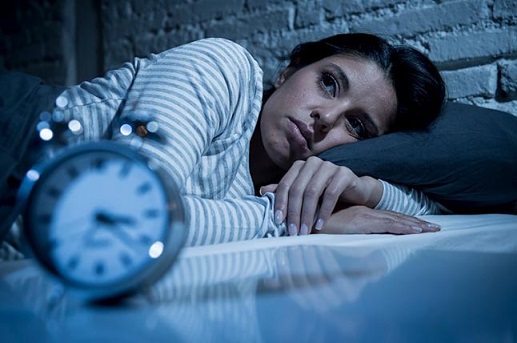SARS-CoV-2 induced gut dysbiosis possibly behind growing cases of post-COVID insomnia
Nikhil Prasad Fact checked by:Thailand Medical News Team Jul 24, 2024 8 months, 2 weeks, 5 days, 21 hours ago
COVID-19 News: The COVID-19 pandemic has left an indelible mark on global health, affecting millions worldwide. One lesser-known consequence of COVID-19 is its potential impact on sleep, particularly in the form of insomnia. Recent research from a team at Heilongjiang University of Chinese Medicine in Harbin, China, sheds light on how gut microbiota might influence insomnia following COVID-19 infection. This
COVID-19 News report delves into these findings and explores the potential mechanisms and treatments.
 SARS-CoV-2 induced gut dysbiosis possibly behind growing cases of post-COVID insomnia
The Growing Problem of Post-COVID Insomnia
SARS-CoV-2 induced gut dysbiosis possibly behind growing cases of post-COVID insomnia
The Growing Problem of Post-COVID Insomnia
Insomnia, characterized by difficulty falling or staying asleep, has become increasingly prevalent in recent years. During the COVID-19 pandemic, reports of sleep disturbances surged. According to various studies, the prevalence of insomnia in COVID-19 patients ranges from 34% to 82%. For instance, a meta-analysis in China reported that 37% of COVID-19 patients experienced insomnia symptoms that persisted over time. The study findings highlight how gut microbiota (GM) might be a significant factor in this troubling trend.
The Role of Gut Microbiota
The human gut is home to trillions of microorganisms, collectively known as the gut microbiota. These microorganisms play crucial roles in digestion, immune function, and even mental health. Emerging evidence suggests that the gut microbiota can influence sleep patterns and may be linked to insomnia. In COVID-19 patients, changes in gut microbiota composition have been observed, potentially contributing to sleep disturbances.
Changes in Gut Microbiota After COVID-19
COVID-19 has been shown to alter the gut microbiota significantly. Patients often exhibit a decrease in beneficial bacteria and an increase in harmful pathogens. The virus's impact on the gut is mediated through several pathways, including the immune response and the gut-brain axis. For example, SARS-CoV-2, the virus responsible for COVID-19, binds to ACE-2 receptors, which are abundant in the gut. This binding can lead to inflammation and disruption of the gut barrier, resulting in dysbiosis (an imbalance in the gut microbiota).
Clinical Evidence Linking Gut Microbiota and Insomnia
Several studies have documented the association between gut microbiota and insomnia. Patients with insomnia often show altered gut microbiota profiles compared to healthy individuals. For example, there is often an increased abundance of Lactobacillus and Streptococcus and a decreased presence of Bifidobacterium and Gardnerella. Additionally, changes in the gut microbiota are linked to the production of metabolites like short-chain fatty acids (SCFAs), which can influence sleep by affecting brain function.
Potential Mechanisms
-Immune Pathways
The gut microbiota interacts with the immune system, influencing the production of cytok
ines and other immune mediators. During a COVID-19 infection, a cytokine storm can occur, releasing large amounts of inflammatory molecules that can affect the gut and contribute to insomnia.
-Neuronal Pathways
The gut-brain axis is a bidirectional communication network linking the gut and the brain. Neurotransmitters like serotonin and gamma-aminobutyric acid (GABA), produced by gut bacteria, play critical roles in regulating sleep. Disruptions in gut microbiota can lead to imbalances in these neurotransmitters, potentially causing insomnia.
-Metabolic Pathways
Metabolites produced by gut bacteria, such as SCFAs, can cross the blood-brain barrier and influence brain function. These metabolites can modulate sleep-wake cycles and contribute to the regulation of sleep.
Future Directions for Treatment
Given the link between gut microbiota and insomnia, several potential treatments are being explored:
-Probiotics
Probiotics, which are beneficial bacteria, can help restore balance in the gut microbiota. Studies have shown that probiotic supplementation can improve sleep quality and reduce insomnia symptoms. For example, Lactobacillus and Bifidobacterium strains have been found to increase serotonin levels in the brain, promoting better sleep.
-Prebiotics
Prebiotics are non-digestible food components that promote the growth of beneficial bacteria. They can help maintain a healthy gut microbiota and support the production of sleep-promoting metabolites.
-Fecal Microbiota Transplantation (FMT)
FMT involves transferring gut microbiota from a healthy donor to a patient. This procedure has shown promise in treating various conditions linked to gut dysbiosis, including insomnia.
-Traditional Chinese Medicine (TCM)
TCM approaches, such as acupuncture and herbal remedies, have been used to treat insomnia for centuries. Recent studies suggest that these methods can modulate the gut microbiota and improve sleep.
Conclusion
The relationship between gut microbiota and insomnia, particularly in the context of COVID-19, is a burgeoning field of research. Understanding how gut bacteria influence sleep can lead to innovative treatments for insomnia. Adjusting diet, incorporating probiotics and prebiotics, and exploring traditional remedies may offer relief to those suffering from post-COVID insomnia.
The study findings were published in the peer-reviewed journal: Frontiers in Psychiatry.
https://www.frontiersin.org/journals/psychiatry/articles/10.3389/fpsyt.2024.1423715/full
For the latest
COVID-19 News, keep on logging to Thailand Medical News.
Read Also:
https://www.thailandmedical.news/news/compared-to-earlier-sars-cov-2-variants,-omicron-causes-a-greater-degree-of-dysbiosis-of-the-intestinal-microbiota
https://www.thailandmedical.news/news/covid-19-news-immune-dysfunction-altered-immune-metabolism-dysbiosis-neuroinflammation-and-viral-persistence-are-issues-causing-long-covid
